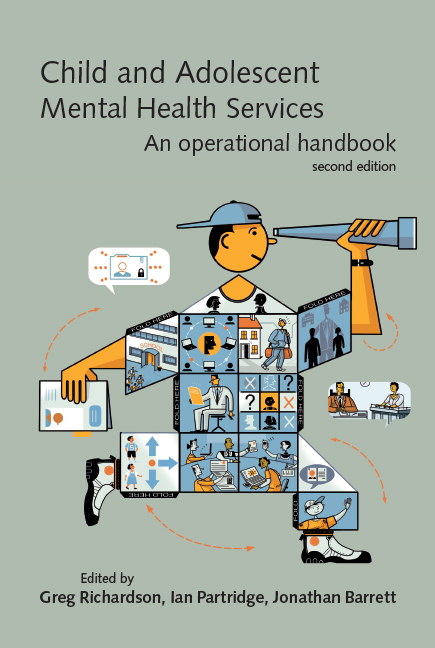Book contents
- Frontmatter
- Contents
- Tables, boxes and figures
- Contributors
- Abbreviations
- Preface
- 1 Introduction
- 2 CAMHS in context
- 3 CAMHS and the law
- 4 Structure, organisation and management of CAMHS
- 5 Evidence-based practice
- 6 Clinical governance
- 7 Education, supervision and workforce development
- 8 Multidisciplinary working
- 9 User and carer participation and advocacy
- 10 A comprehensive CAMHS
- 11 Referral management
- 12 Demand and capacity management
- 13 Strategies for working with Tier 1
- 14 Structuring and managing treatment options
- 15 CAMHS in the emergency department
- 16 Paediatric liaison
- 17 Self-harm
- 18 Learning disability services
- 19 Services for autism-spectrum disorders
- 20 Attentional problems services
- 21 Eating disorder teams
- 22 Bereavement services
- 23 CAMHS for refugees and recent immigrants
- 24 CAMHS and looked-after children
- 25 Drug and alcohol teams
- 26 Parenting risk assessment service
- 27 Court work
- 28 Tier 4 options
- 29 In-patient psychiatric care
- 30 Forensic services
- 31 Neuropsychiatry and neuropsychology services
- 32 Mental health provision for deaf children: study of a low-incidence service provision
- 33 Chief Executives – what do they want and how do they get it?
- Index
29 - In-patient psychiatric care
- Frontmatter
- Contents
- Tables, boxes and figures
- Contributors
- Abbreviations
- Preface
- 1 Introduction
- 2 CAMHS in context
- 3 CAMHS and the law
- 4 Structure, organisation and management of CAMHS
- 5 Evidence-based practice
- 6 Clinical governance
- 7 Education, supervision and workforce development
- 8 Multidisciplinary working
- 9 User and carer participation and advocacy
- 10 A comprehensive CAMHS
- 11 Referral management
- 12 Demand and capacity management
- 13 Strategies for working with Tier 1
- 14 Structuring and managing treatment options
- 15 CAMHS in the emergency department
- 16 Paediatric liaison
- 17 Self-harm
- 18 Learning disability services
- 19 Services for autism-spectrum disorders
- 20 Attentional problems services
- 21 Eating disorder teams
- 22 Bereavement services
- 23 CAMHS for refugees and recent immigrants
- 24 CAMHS and looked-after children
- 25 Drug and alcohol teams
- 26 Parenting risk assessment service
- 27 Court work
- 28 Tier 4 options
- 29 In-patient psychiatric care
- 30 Forensic services
- 31 Neuropsychiatry and neuropsychology services
- 32 Mental health provision for deaf children: study of a low-incidence service provision
- 33 Chief Executives – what do they want and how do they get it?
- Index
Summary
‘“It all comes”, said Pooh crossly, “of not having front doors big enough.”’
A. A. Milne, Winnie the PoohIntroduction
Despite the development of home treatment teams and early intervention psychosis services, the demand for in-patient child and adolescent beds remains. It is rare for young people with mental disorders to require inpatient services, but when they do, beds are few and far between. Reasons for admission include severity of illness, deterioration in psychological functioning despite community treatment, high risk to self or others, or family difficulties making treatment difficult, any of which may lead to the need for 24-hour care (Green & Worrall-Davies, 2008). In-patient care is a specialised field providing treatment for young people with serious psychiatric illness by skilled and experienced staff.
Who and what are in-patient units for?
There is a range of psychiatric, educational, social, criminal and societal indicators for admission to an in-patient service. It is usually impossible to separate the different aspects or contributors to the young person's disorder so that each can be provided by the different agencies responsible for it. Psychological disorders, because of adverse life experiences, are common and pure psychiatric disorders are rare, but they all have educational and social precursors and sequelae. Trying to compartmentalise children into unidisciplinary treatment pigeonholes is problematic as:
• admission to psychiatric in-patient units considerably disrupts education and the young person's functioning in the community
• education authorities have to meet young people's special educational needs but cannot isolate these from other social and mental health factors, which they often do not have the resources to address
• residential policies of Social Services departments tend to address young people's mental health and educational needs only as secondary considerations
• the Home Office and Ministry of Justice, which will provide care in a prison setting, have little investment in childhood preventative work for the large proportion of young people with conduct disorder and complex needs when they become adults.
Work on sharing residential responsibility and input requires considerable inter-departmental and inter-agency working, but each agency will be uncertain who is going to reap the most for investing in them, and the harvest is not guaranteed.
- Type
- Chapter
- Information
- Child and Adolescent Mental Health ServicesAn Operational Handbook, pp. 270 - 283Publisher: Royal College of PsychiatristsFirst published in: 2017



